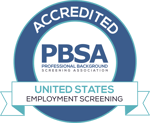-jpg.jpeg)
Your employee failed a drug test, and you find yourself asking: “What should I do?”. Hint - it is all in your written policy! An employer can enforce their written drug testing policy with an employee or prospective employee who tests positive.
Drug Test Policies
It is critical to use clear and concise language when writing your drug testing policies. Be sure to consult with an employment attorney and check with local legislation for employer requirements and restrictions. If you find yourself in a situation where an employee or prospective employee has tested positive; be thoughtful when evaluating potential adverse action and be consistent with previous circumstances.
Examples of Positive Drug Test Policy Practices:
- Rescind offer of employment.
- Employee may not return to work until they comply.
- Employee may not return to work until rehabilitation has occurred.
- Employee may retest within a certain time frame.
- Zero tolerance policy (employee is terminated).
Pro Tip: If you choose to give your employee a second chance after testing positive for drugs at work, be sure your policy reflects the consequences for future actions (including the possibility of a second failed test.)
Drug Testing Frequency
There are three common frequencies when drug testing: pre-employment, post-incident, and random.
Pre-Employment: Washington D.C. unanimously passed legislation in 2014 requiring employers to drug test a prospective employee only after a conditional offer of employment has been made. The offer of employment can be rescinded if the applicant tests positive for the drug test.
Post Incident: After an on-the-job accident has occurred, you may choose to test the employee involved.
Random: You can choose to randomly drug test your employees on a periodic basis, or after an employee’s inability to perform a job, or suspicion of use.
Marijuana
Marijuana is a schedule 1 drug under the Federal Controlled Substances Acts and thus remains illegal on a federal level. However, many state and local legislations have legalized marijuana. At least 29 states have legalized medical marijuana. Currently, there are no state laws or legislation requiring employers to accommodate on-the-job medicinal use of marijuana. Review local legislation prior to adding marijuana to your drug testing policy.
Prescription Drugs
Instead of forbidding controlled substances in your drug policy, wording should be used forbidding unlawful use (or use without a prescription). This is because the employee (or prospective employee) who failed the drug test, may have a prescription for that drug. During the drug testing process, an MRO (Medical Review Officer) will contact the employee to obtain proof of a prescription prior to considering the drug test a fail.
Conclusion
There is no one right way to establish a drug testing policy or how to handle an employee’s positive drug test. When drafting your drug testing policy you should take into account the industry, organization, the job description, and local legislation. Frequency, type, and adverse action should also be considered. At the very least, be thoughtful, thorough, and employ the help of a qualified employment attorney.
Choice Screening Drug & Alcohol Testing
Are you ready to start drug testing? We have several options including urine or hair analysis, rapid, and oral kits ranging with 5 panels, 10 panels, and more. Plus, we have thousands of locations to ensure drug testing is easy for your organization and employees. Contact us to get started today.


